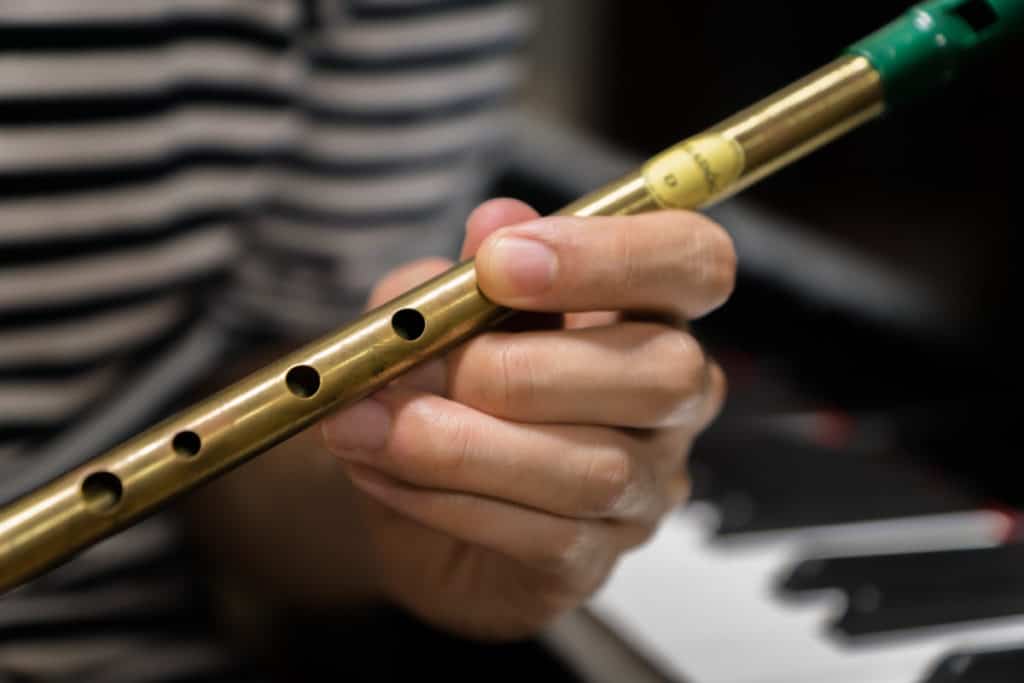This post contains affiliate links. We earn commissions if you purchase products from retailers after clicking on a link from our site. As an Amazon Associate, we earn from qualifying purchases.
Maybe you just found that tin whistle that your spouse put in your Christmas stocking 5 years ago, and you’ve decided to pull it out and at least learn how to make sound with it. You might be feeling sheepish–you know your Tin Whistle may have only cost $30, and it is extremely light! Is the tin whistle a real instrument or is it a toy?

By the way, looking for recording equipment and musical instruments? Check out Sweetwater.com for microphones, monitors, audio interface or any other recording gear that you could ever need. (Affiliate Link)
A tin whistle by technical definition is a musical instrument. Because tin whistles are not as well-known, less people pursue a tin whistle as a career instrument. Tin whistles are the featured instrument for Irish and Scottish folk music. In spite of its obscurity, the tin whistle is considered a serious instrument by many.
What is considered a “serious” or “real” instrument is ultimately up to your personal opinion. An example from an unrelated field is table tennis: Some people don’t consider table tennis a sport, but since being added to the Olympics in 1988, it is taken a lot more seriously than it used to be. It’s mostly up to your perspective! However, we’ll discuss some aspects of the Tin Whistle that may help ease your mind if you are trying to decide if you want to pursue learning the instrument.
Is a Tin Whistle a Serious Instrument?
A tin whistle is a fipple-style flute. A fipple flute is a style of mouthpiece where you blow in the end of the instrument.
The tin whistle has no moving parts, and is similar to the recorder in construction and concept.
A tin whistle has a beautiful, whimsical sound, and despite its incredible simplicity, manages to make a musical piece captivating and compelling.
Before diving into a deeper discussion, my personal opinion is that the effect a tin whistle has on a song is proof enough of its real instrument classification.
What Does it Mean To Be a Serious Instrument?
I put some thought into why someone might consider one instrument to be a toy and another instrument to be a serious instrument. These categories come to mind as factors that people hold an instrument to:
- Cost
- Instrument Flexibility
- Instrument Complexity
- Examples of Career Tin Whistle Musicians
- Music Styles That Feature the Tin Whistle
Does Cost Define a Serious Instrument?
If you go to a music store, you can spend thousands of dollars on a piano–even tens of thousands! A trumpet can cost several thousands of dollars, a concert flute can cost several thousands of dollars. Even the student versions of these instruments can cost up to a $1000.
A tin whistle on the other hand is extremely inexpensive when talking about musical instruments.
What is the Price Range for a Tin Whistle?
A professional quality tin whistle can be purchased for under $300. An entry-level tin whistle can be purchased for under $20.
The Feeling of Missing Out and Expensive Instruments
If you go on a cruise, and you get the basic package with no frills, then you may experience the feeling of missing out by the end of the trip because you are haunted by the fact that you didn’t spend the extra money on the deluxe package.
When comparing different options, it’s easy to think and feel that you’re missing out on something if you don’t buy the most expensive item.
This is true for musical instruments and for vacation packages. It might be tempting to think that because the tin whistle is so inexpensive that you’re not investing in a serious instrument.
Remember though, there’s one instrument that we all have that none of us have to buy: Our Voice.
Nobody argues that talented vocalists are real musicians. Why should the price tag of an instrument determine whether it’s a serious instrument?
Instrument Flexibility and Complexity
One valid point when considering the seriousness of an instrument is how dynamic it is. How many genres can an instrument be used? In what situations?
Think of the guitar. The guitar is one of the most versatile instruments known to man. The number of songs featuring guitar, especially in the United States, is well into the millions. Nobody has any doubt that the guitar is a serious instrument because of it’s range and capacity to fit in so many styles of music.
The piano is one of the most flexible instruments out there the piano because it can play every note almost through our entire listening range.
A tin whistle, by design, is not very flexible. It is not a chromatic instrument, and is stuck in the key the pipe is tuned to when it’s made. It can only comfortably play in any mode of a particular scale. If you want to change keys, then you have to change tin whistles. Fortunately, that’s not cost prohibitive since tin whistles are so inexpensive.
Tin whistles also have a very distinctive sound that’s only caught on to very specific genres. Not to say it couldn’t be used for more! But generally you’ll only hear it in certain types of music.
Instrument Complexity
Trumpets are sometimes thought to be simple instruments because they only have 3 buttons. Any trumpet player will tell you that it’s not nearly that simple, since the embouchure of a trumpet player is an extremely fine-tuned set of muscles. Books and blogs have written endlessly about the trumpet embouchure.
Complexity seems to attract respect for an instrument. I’m not saying it’s valid, but people seem to naturally respect someone more for playing a more complex instrument. A player of the pipe organ with multiple keyboards and thousands of pipes gains respect and admiration easily! (even if they’ve never even used half of the stops).
Early students (and their parents) sometimes want to play an instrument that is considered complex and difficult (such as the double-reed oboe), or the violin, not for the sake of the instrument, but for the challenge.
Tin Whistles have no moving parts, so as far as instruments go they are remarkably simple. A curious student can learn the basics of a tin whistle faster than many other instruments. However, like any instrument, it can take years of practice to hone the technique and technical ability to master the tin whistle.
Examples of Career Whistlers
I won’t pretend to know more than I do about tin whistle careerists–I’m just learning about the tin whistle myself, and I was enamored by the incredible skill of these tin whistle players featured in this blog post.
It’s clear that many professional musicians use the tin whistle to a level that is stunning and impressive. Mary Bergin is a tin whistle legend, and after watching a few videos it’s clear she has total command of the instrument.
Wikipedia also catalogs several other notable tin whistle players.
Here’s another video I’ve really enjoyed with Brian Finnegan:
After watching this, it’s clear that the tin whistle is a real instrument with incredible depth and flexibility.
Music Styles That Feature the Tin Whistle
If you think of the tin whistle, it’s very likely you think of Irish traditional folk music, and there’s good reason! The tin whistle is often featured in many Irish folk songs, but you’ll hear it in some folk rock nowadays.
The tin whistle is also featured in traditional Scottish folk music as well.
To be fair, the penny whistle is not very common outside of traditional Irish or Scottish folk music–but it remains a powerful instrument and will turn up now and again in songs you listen to on the radio.
The tin whistle gained a lot of attention after being featured in “Concerning Hobbits” from the Lord of the Rings movie trilogy starting in 2001, and if you enjoy some 70’s music including Simon and Garfunkel or Cat Stevens, they have the tin whistle in some of their songs.
Conclusion
Still having reservations about the tin whistle? Without doubt, the tin whistle can be a career instrument. A real instrument. The tin whistle fits more snugly in Irish or Scottish folk music, but still has a place in contemporary music depending on the creativity of the composer and the artist playing.
